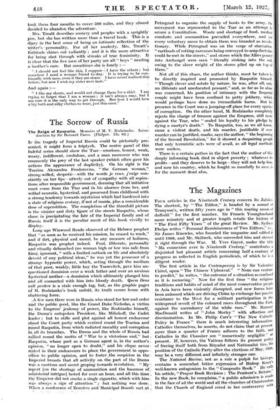The Sorrow of Russia
The Reign of Rasputin. Memoirs of M. V. Rodzianko. Intro- ' duction by Sir Bernard Pares. (Philpot. 12s. (3d.) Ii. the tragedy of Imperial Russia could be pictorially pre, sented, it might form a triptych. The centre panel of this baleful series should show the Tsar—uxorious, honest, weak, weary, indifferent, credulous, and a man moreover who was commonly the prey of the last speaker (which often gave his actions the appearance of duplicity). On his right is the Tsarina Alexandra Feodorovna, "the German woman,". strong-willed, despotic—with the words je veux, lexige eon. stantly on her lips—utterly out of sympathy with all aspira- tions after responsible government, deeming that all initiative must come from the Tsar and in his absence from her, and withal neurotic, hysterical, and possessed from childhood with a strong tendency towards mySticisin Which had hardened into a state of religious ecstasy, if not of mania, plus a considerable dose of superstition. The completion of the threefold picture is the sinister and dirty figure of the starets Rasputin, whose share in iireeipitating the fate Of the Imperial family and of Russia itself it is the peculiar merit of this book vividly to display.
• Long ago Winwood Reade observed of the Hebrew prophet that "as soon as he received his mission, he ceased to -wash," and if dirt, physical and moral, be any measure of holiness,- Rasputin was prophet indeed. Foul, illiterate, personally. and -ritually debauched (no woman high or low was Safe from him), ignorant," with a limited outlook on life and absolutely devoid of any political ideas," he was yet the possessor of a strange hypnotic power, which, acting through-the medium of that poor, weakly, little boy the Tsarevitch, gave him un- questioned dominion over a weak father and over an anxious• hysterical mother—a dominion which ultimately plunged him and all connected with him into bloody death, Quena Deus* vult perdere is a stale enough tag, but, as the graphic pages of M. Rodzianko's book unfold, its truth comes home With shattering force.
few men there were in Russia who stood for law and order and the public good, like the Grand Duke Nicholas, a victim. , to:the Empress' jealousy .of power, like Rodzianko himself, - the Duma's outspoken President, like Militikoff, the Cadet : - leader ; but to stifle and plot against all honest endeavour: stood the Court party which centred round the Tsarina and', round Rasputin, from which radiated rascality and corruption • ira all its branches. The Duma and the whole of Russia had rallied round the motto of "War to a victorious end," but,
Rasputin, whose part as a German agent is, in the author's opinion, "no- longer open to doubt,"• and his 'clique never
rested in their endeavours to place the government in oppo- sition to public opinion, and to foster ,the suspicion in the Imperial breasts that all activity on the part of the Duma wak a cautious and secret groping towards 'revolution. " My : report [on the shortage of ammunition and the baseness of; miOisterial intrigue] lasted for over an hour, and all this time , the Emperor did not smoke a single cigarette, which with him. was always a sign of attention " ; but nothing was done. INllien a conference of Zemstvo and Municipal Boards met at Petrograd to organize the supply of boots to the, army, tht movement, was represented .to. the. :Tsar as an attempt to secure a Constitution. Waste and shortage of food, medial comforts . and amMunition -prevailed .everywhere, iind yet every voluntary move to obtain them was branded as revolu- tionary. While, Petrograd was on the verge of starvation, "cartloads of rotting eareaSsesbeing-conveyed to spapdactoriis could be met in the streets," and stores which the Allies poured into Archangel were -seen "literally Sinking into the Soil, owing to the sheer weight, of the _stores piled up on- top of them."
Not all of this chaos, the author thinks, must be taken to be directly inspired and promoted' by .Rasputin himself. "Though clever and astute by nature, he was, after all, onlr an illiterate and uneducated peasant," and, so far as he alone was concerned, his position of intimacy with the Imperial couple might have been confined to petty jobbery, which would perhaps have done no irremediable harm. But lik presence in the Court was a jumping-off place for every species of corruption. On the other hand, M. Rodzianko completely rejects the charge of treason against the Empress, still more against the Tsar, who "sealed his loyalty to his pledge by dying a martyr's death." To Rasputin, too, as we all know, came a violent death, and his murder, justifiable if ever murder can be justified,. marks, says the author, " the beginning of the Second Revolution," for it showed a despairing people that only terroristic acts were of avail, as all legal methods were useless.
There is a certain pathos in the fact that the author of this deeply informing book died in abject poverty; whatever its profits—and they deserve to be large—they will not help his, and now his country, which he fought so manfully to save, is for the moment dead also.






























































 Previous page
Previous page